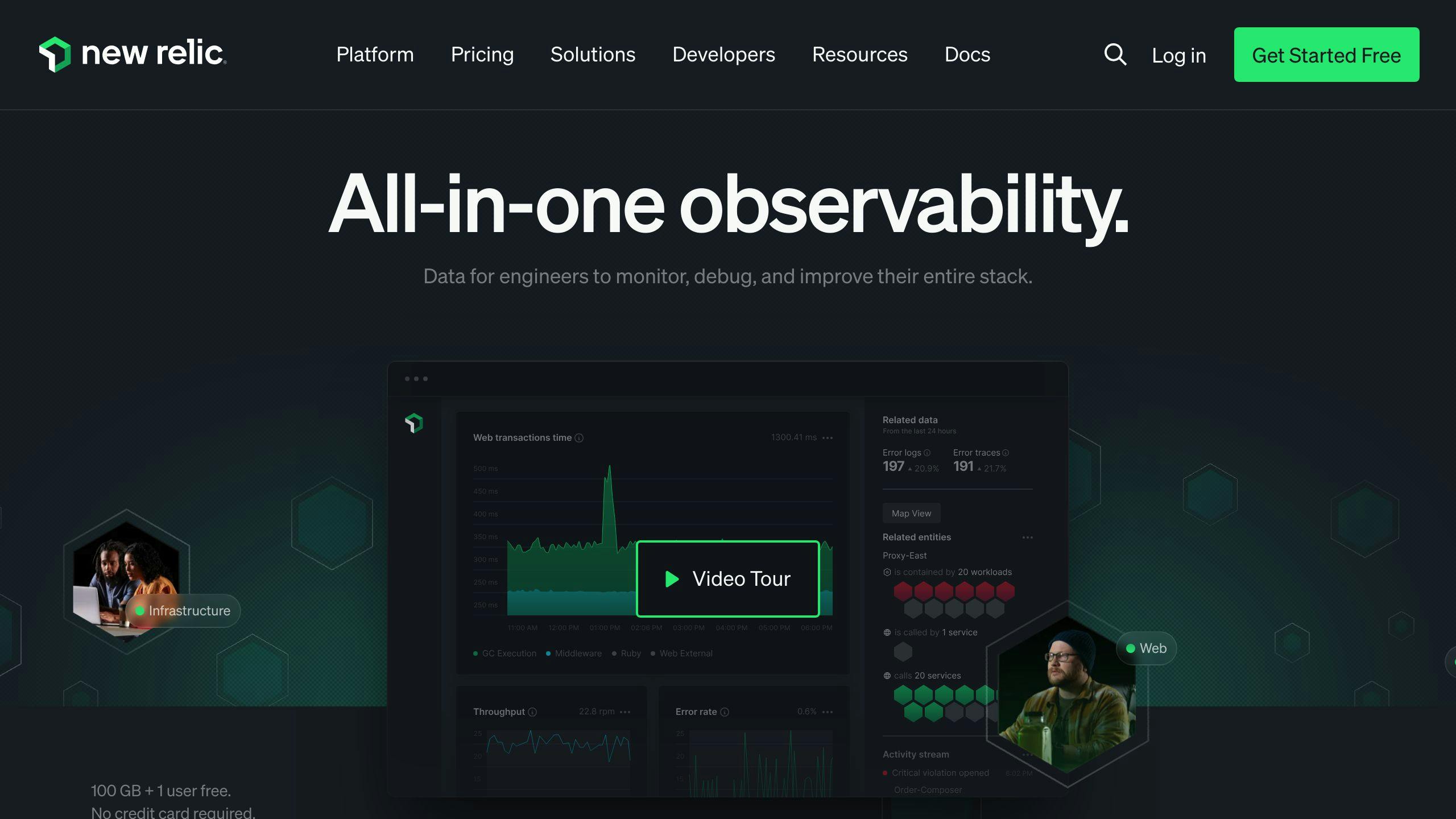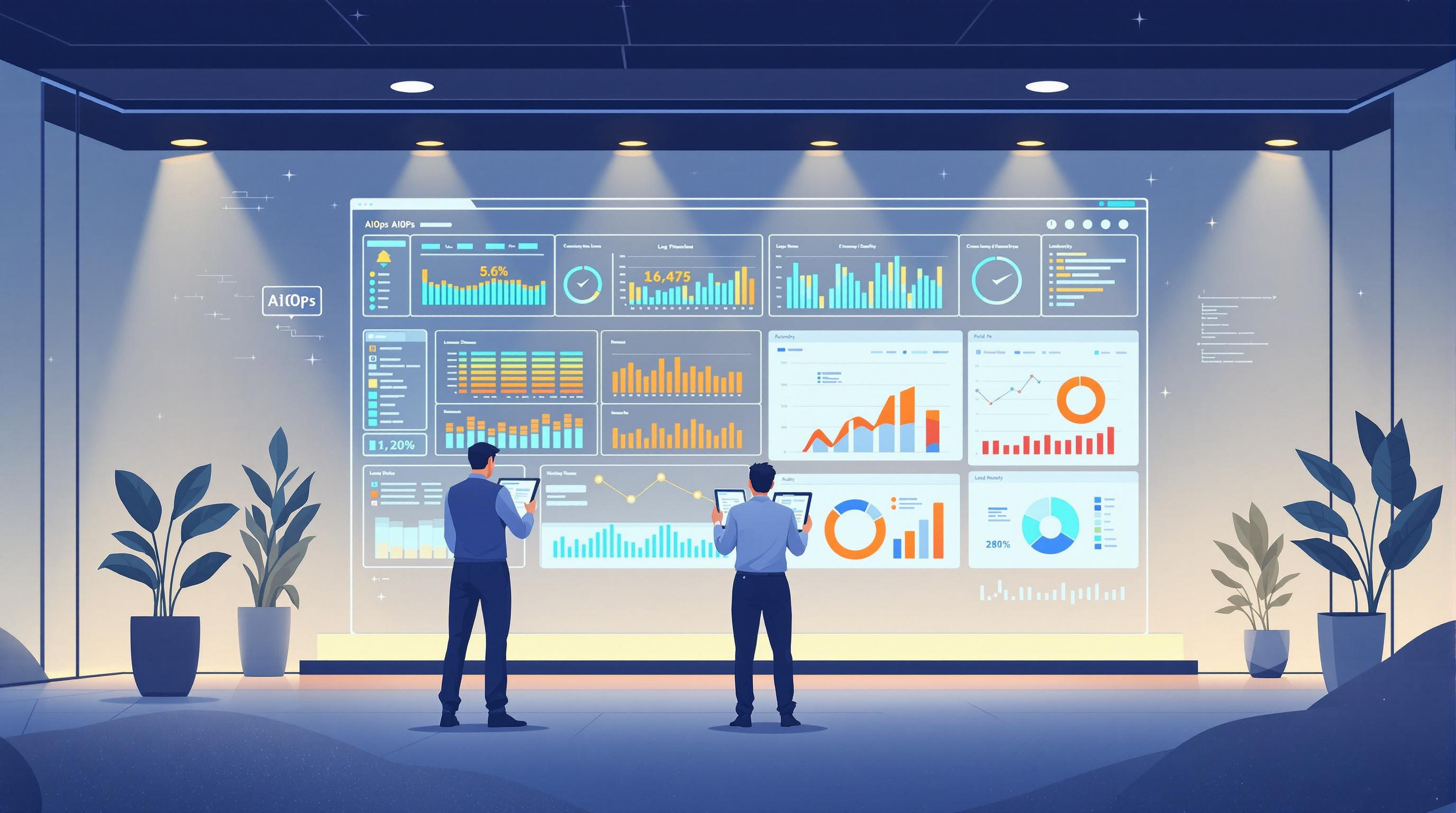Looking to switch from Datadog AI? Here's a quick rundown of the top alternatives:
- New Relic
- Dynatrace
- AppDynamics
- AIOps platforms
These tools offer various features for IT monitoring and observability. Here's how they compare:
| Tool | Key Features | Pricing | Best For |
|---|---|---|---|
| New Relic | AI-powered insights, error pinpointing | Variable, agent management not included | Companies needing detailed error tracking |
| Dynatrace | Full-stack monitoring, single agent | $69/month for 8 GB per host | Large enterprises with complex systems |
| AppDynamics | Code-level diagnostics, business impact analysis | Starts at $60/month per CPU core | Organizations linking tech issues to business outcomes |
| AIOps | Multi-source data analysis, anomaly detection | Varies widely | Companies with diverse IT ecosystems |
When choosing an alternative, consider:
- Scalability needs
- Integration capabilities
- AI/ML features
- Budget constraints
- Ease of use
Each option has its strengths and weaknesses, so pick the one that best fits your specific IT monitoring requirements.
Related video from YouTube
1. Alternative 1: New Relic

New Relic is a good option to replace Datadog AI. It offers many tools for watching and understanding how your computer systems are working.
AI and Machine Learning
New Relic uses AI to help you:
- Ask questions and get quick answers
- Find unusual patterns in your data
- Predict problems before they happen
Working with Other Tools
New Relic is good at showing you information from different parts of your system:
- You can see how different apps are connected
- It works with Java and other types of software
- It tells you exactly where errors are happening
Cost
When thinking about using New Relic, keep in mind:
- It doesn't manage agents (small programs that collect data)
- This might mean extra costs for some companies
| Feature | What it Does |
|---|---|
| AI Help | Answers questions, finds odd patterns |
| Error Finding | Shows where problems are happening |
| Connects Apps | Lets you see how different programs work together |
| Works With | Java and other types of software |
| Cost Note | Might cost more because it doesn't manage agents |
New Relic is a strong choice if you want to stop using Datadog AI. It has good AI features and works well with many types of software. But make sure to check if it fits your budget and what your company needs.
2. Alternative 2: [Name]
Scalability
This tool can handle lots of data from different sources. It works well for big and small IT setups without slowing down.
Integration
The software works well with other monitoring tools. This helps teams see everything in one place and work together better.
| Integration Benefits |
|---|
| Shows all data in one view |
| Helps teams work together |
| Connects different tools |
Machine Learning
The tool uses smart computer programs to:
- Spot problems before they happen
- Find odd patterns in data
- Link related events
- Cut down on false alarms
| Machine Learning Features | What It Does |
|---|---|
| Problem prediction | Spots issues early |
| Pattern finding | Sees unusual data |
| Event linking | Connects related alerts |
| Alert reduction | Cuts down on false alarms |
Pricing
While we don't have exact prices, this tool can save money by:
- Fixing problems faster
- Making systems more reliable
But, make sure to check if the price fits your budget and needs.
| Cost Considerations |
|---|
| May reduce fix times |
| Could improve system reliability |
| Check if it fits your budget |
3. Alternative 3: [Name]
Scalability
This tool can handle lots of data from many sources as your company grows. It works well for both small and large IT setups without slowing down. You can add more resources when you need them.
Integration
This software connects easily with many other tools and data sources. This helps teams see all their information in one place.
| Integration Benefits |
|---|
| Shows all data in one view |
| Works well with tools you already use |
| Helps teams work together better |
| Less switching between different tools |
Machine Learning
The tool uses smart computer programs to help you:
| What It Does | How It Helps |
|---|---|
| Find odd patterns | Spots problems before they affect users |
| See trends | Understands how your system usually works |
| Find problem causes | Helps fix issues faster |
| Use resources better | Suggests ways to improve based on how you use the system |
Pricing
We don't have exact prices, but this tool offers different plans to fit various company sizes and needs. Here's what to know:
| Pricing Info | Details |
|---|---|
| Plan Types | Based on how much data you use and how long you keep it |
| Payment Options | You can pay monthly or yearly |
| Big Company Plans | Special pricing for very large setups |
When thinking about cost, look at how the tool might help you save money by fixing problems faster and making your system work better.
sbb-itb-9890dba
4. Alternative 4: New Relic
Scalability
New Relic works well for both small and big IT setups. It can:
- Track info across different apps in one place
- Grow with your company
- Handle more data as you need it
Integration
New Relic connects easily with many tools. It works with:
- Java
- Other software types
- Various data sources
| Benefits of New Relic Integration |
|---|
| See all data in one view |
| Works with tools you already use |
| Helps teams work better together |
| Less switching between tools |
Machine Learning
New Relic uses smart computer programs to help you:
| Feature | What It Does |
|---|---|
| AI chat | Ask questions about your data |
| NRQL console | Look at data in detail |
| Error finder | Shows exactly where problems are |
| App alerts | Warns you about possible issues |
These features help teams fix problems faster and keep systems running smoothly.
Pricing
New Relic's pricing is not fixed. Here's what to know:
| Cost Factor | Details |
|---|---|
| Agent management | Not included, might cost extra |
| Custom options | May change the price |
| Size of use | Bigger setups might cost more |
When thinking about New Relic instead of Datadog AI, look at these costs along with what the tool can do for you.
5. Alternative 5: AppDynamics

Scalability
AppDynamics works well for small and big companies. It can:
- Find how apps connect to each other
- Work with many coding languages like Java, .NET, Node.js, PHP, Python, and C/C++
- Help fix slow apps and errors
As your company grows, AppDynamics can handle more data and complex systems.
Integration
AppDynamics connects well with other tools:
| Feature | How it Helps |
|---|---|
| Works with many coding languages | Watches different types of apps |
| Looks at code closely | Finds exactly where problems are |
| Links tech issues to business results | Shows how tech problems affect your company |
These features help you see and manage all your apps in one place.
Machine Learning
AppDynamics uses smart computer programs to:
- Connect business numbers with how apps are working
- Warn about problems that affect your business
- Guess future issues before they cause trouble
These smart features help teams fix problems quickly and stop new ones from happening.
Pricing
Here's what to know about AppDynamics costs:
| Cost Info | Details |
|---|---|
| Lowest price | $60 each month for one CPU core |
| How to pay | Monthly or yearly plans |
| Changes | Price may be different based on what you need |
When thinking about using AppDynamics instead of Datadog AI, look at these prices and see if they fit what your company needs and can afford.
Good and Bad Points
When looking at other options instead of Datadog AI, it's important to think about what's good and not so good about each one. Let's look at the main choices we talked about:
| Option | Good Points | Not So Good Points |
|---|---|---|
| Dynatrace | - Watches all parts of your system - Uses one small program for all checking - Finds the main cause of problems - Checks users, servers, network, cloud, and containers |
- Costs more ($69/month for 8 GB per host) - Might be hard for small companies to use |
| AIOps | - Looks at info from many places - Finds odd things in your data - Links related events - Works with tools you already have - Looks at all of IT work |
- Teams might need time to learn how to use it - Might take a lot of work to set up |
| AppDynamics | - Works for small and big companies - Works with many coding languages - Looks deep into code to find problems - Shows how tech issues affect business - Uses smart computer programs |
- Starts at $60/month for each CPU core - Price might change based on what you need |
When picking one of these options, think about:
- How big it can get: Dynatrace and AppDynamics can grow with your company. AIOps can too, but it might need more setup at first.
- How it works with other tools: All three work well with other programs. Dynatrace uses one small program for everything, and AppDynamics works with many coding languages. AIOps is good at bringing info from different places.
- Smart features: Dynatrace finds the main cause of problems. AIOps spots odd things and links events. AppDynamics uses smart programs to guess future issues.
- Cost: Think about your money carefully. Dynatrace and AppDynamics have set prices. AIOps prices can change a lot based on what you pick and how you use it.
- How easy it is to use: Dynatrace might be easier to start using. AppDynamics has screens that are easy to understand. AIOps might need more know-how to use well.
Wrap-up
When looking at other options instead of Datadog AI, think about what your company needs and can afford. Here's a quick look at the main choices we talked about:
| Tool | Good Things | Not So Good Things |
|---|---|---|
| Dynatrace | - Checks all parts of your system - Uses one small program for everything - Finds the main cause of problems - Works for users, servers, network, cloud, and containers |
- Costs more ($69/month for 8 GB per host) - Might be hard for small companies |
| AIOps | - Looks at info from many places - Finds odd things in your data - Links related events - Works with tools you already have |
- Teams might need time to learn it - Might take a lot of work to set up |
| AppDynamics | - Works for small and big companies - Works with many coding languages - Looks deep into code to find problems - Shows how tech issues affect business |
- Starts at $60/month for each CPU core - Price might change based on what you need |
When picking a tool:
- Think about how big your company is and how much it might grow
- Check if it works with the tools you already use
- Look at what smart features it has
- See if you can afford it
- Make sure it's not too hard to use



